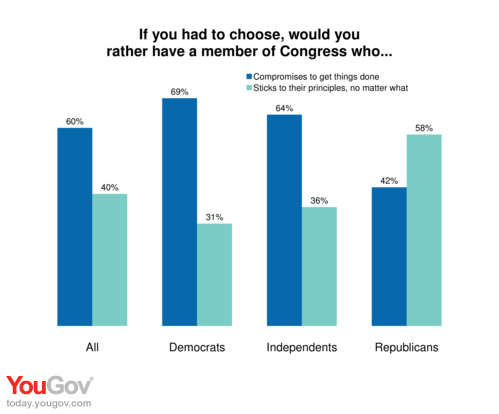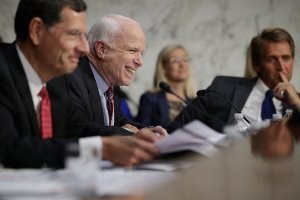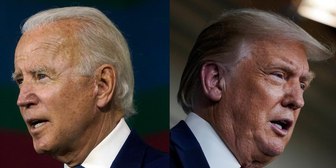Expectations for the new Congress are low, but many are ok with debt ceiling threats in order to cut federal spending.
(Week of September 2, 2013) Congress returns to a packed agenda, beginning with votes on the authorization of the use of military force in Syria. Those hearings already have begun. There are other critical issues Congress faces in the next few months. While the public expects Congress to meet one deadline – raising the debt ceiling – the latest Economist/YouGov Poll finds the country expecting little else from the returning Congress.
The Congressional vacation – and the opportunity Members had to meet with constituents – did not help its overall rating very much. In early July, 7% approved of the way Congress was handling its job. In this week’s poll, while it has nearly doubled, it is still an anemic 13%. 63% disapprove, just as they did then.
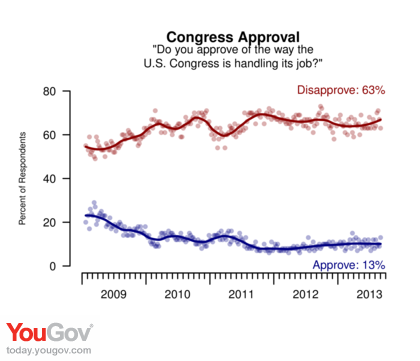
Congress has been burdened with low approval – and low expectations – for several years. Congressional leadership – on both sides of the aisle – gets poor marks from the public. Favorable ratings of the four leaders range from 21% to 29%, while about half the public rates each leader negatively. Democrat Nancy Pelosi, House Minority Leader and former Speaker, and the current Republican Speaker, John Boehner, are the most well-known.
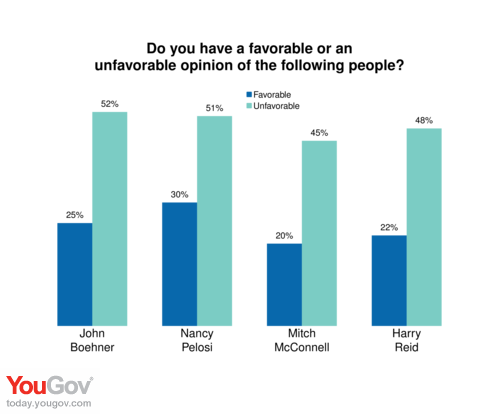
In the case of the GOP leadership, Boehner and Mitch McConnell, the Senate Mi- nority Leader, even many in their own party hold negative views. A third or more of Republicans view Boehner and McConnell unfavorably. In the case of McConnell, negative assessments from Republicans almost outnumber positive ones.
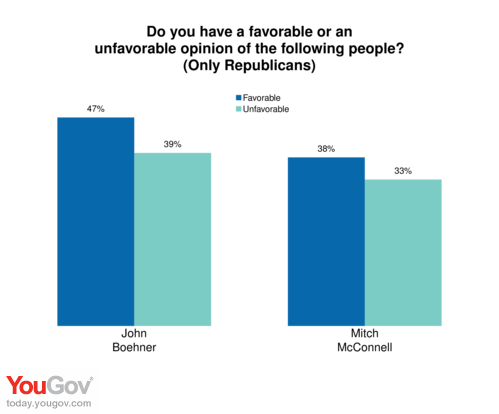
The Democratic leadership, Pelosi and Senate Majority Leader Harry Reid, fare somewhat better with their own partisans. More than twice as many Democrats have a favorable opinion of Pelosi than have an unfavorable one. For Reid, the comparable percentages among Democrats are 37% favorable, 24% not favorable.
What do Americans expect from the returning Congress? They do expect one crisis to be averted: two in three expect that Congress will raise the debt ceiling. That may come with a price, one that would certainly result in extensive debate: by 45% to 34%, Americans say they would approve of Republicans using the vote on debt ceiling legislation to force President Obama to reduce federal spending.

Not surprisingly, 77% of Republicans approve of this tactic, but so do 45% of independents and 22% of Democrats.
Hopefulness about increasing the debt ceiling does not mean that Americans expect Congress to agree on a budget. Less than a third say that is likely, not much different from the percentage who said that was likely in July. However, the threat of a government shutdown might compel action. In fact, by more than two to one, Americans think that the threat of a shutdown will force Congress to agree on a budget.

Both Republicans and Democrats agree that a shutdown over the budget is unlikely. One reason for this may be that when asked whom they would blame if there were a shutdown, Americans are just as likely to blame President Obama as to blame the Republicans in Congress, and one in four would blame both.
Yet when it comes to other legislation, expectations are lower, even on issues that have sizable public support. 63% want the minimum wage increased (it has not been raised in four years, and President Obama proposed an increase in this year’s State of the Union message), but just 37% expect that Congress will raise the minimum wage this year.
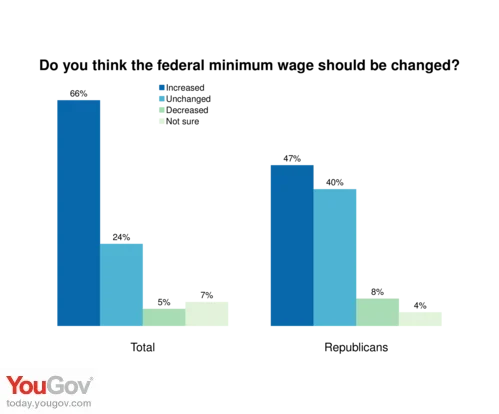
Republicans are divided on whether the minimum wage should be increased. Earlier this year, House Republicans voted unanimously against doing just that.
Immigration reform may be a more contentious issue, with a public divided evenly on whether or not there should be a pathway to citizenship for those now in the United States illegally. In addition, partisans are clearly on opposite sides on this issue: 63% of Democrats favor a pathway to citizenship, 66% of Republicans oppose one. But more expect there will be immigration reform than think the minimum wage will be raised. Still, a plurality of Americans are skeptical.
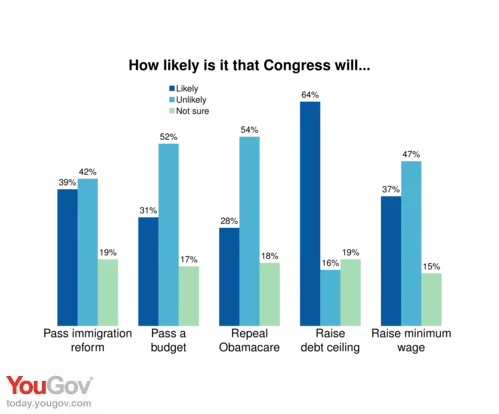
More than a third of Americans (and 70% of Republicans) want the Affordable Care Act, also known as Obamacare, to be repealed, but not even Republicans expect this will happen.
One of the difficulties that has affected the divided Congress in recent years is an inability to compromise – something most Americans want to see. 60% would prefer a Congressional representative who compromises in order to get things done, as opposed to one who always sticks to principle, no matter what. Members of one party are much less in favor of compromise: by 58% to 42%, Republicans want a representative to stick to his or her principle, whatever happens.
